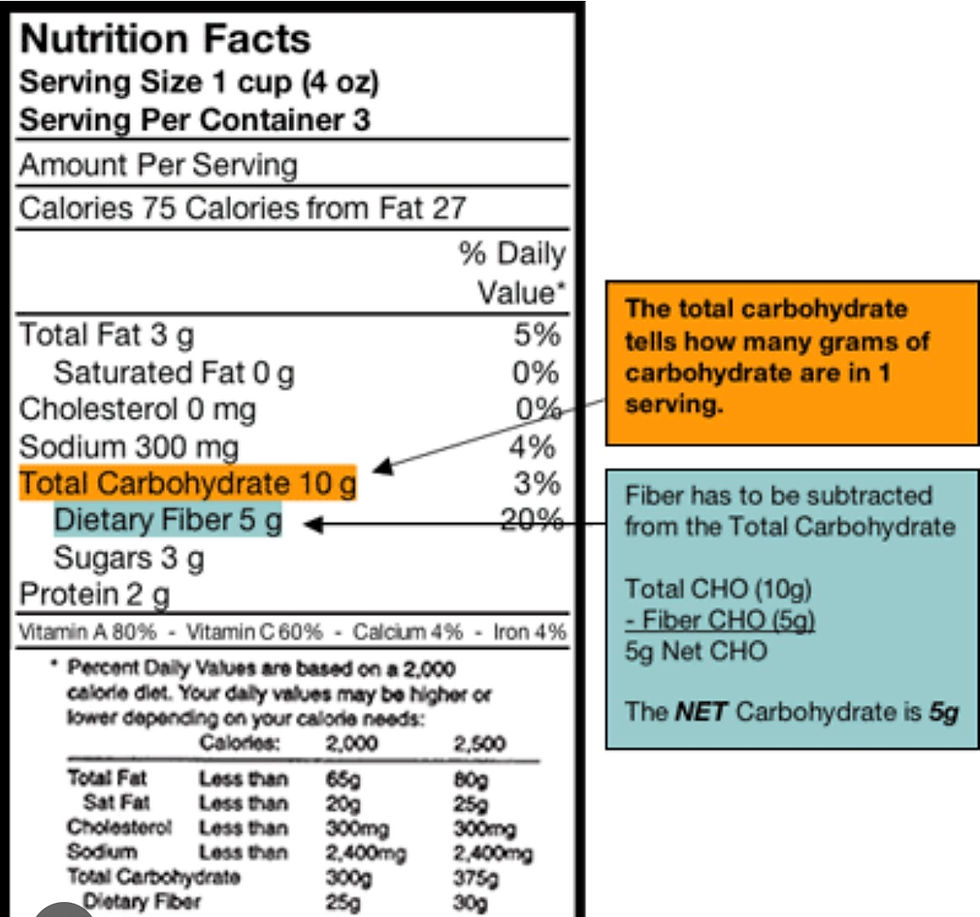How to Calculate Net Carbs for Weight Loss Success: A Complete Guide for Fitness Enthusiasts
- becomemybestme
- Aug 5, 2025
- 4 min read

Looking for effective ways to manage your diet? One key concept that has gained popularity is "net carbs." This guide will clarify how to calculate net carbs and why they matter for your weight loss and fitness goals. By understanding this critical aspect of nutrition, you can make smarter food choices that enhance your journey to better health.
Net carbs are the carbohydrates that affect your blood sugar levels, making them particularly relevant for anyone focused on weight loss. By focusing on net carbs instead of just total carbs, you will see a clearer picture of how your food choices impact your body. Let's jump into the details of what net carbs are, why they are important, and how to accurately calculate them.
What are Net Carbs?
Net carbs represent the carbohydrates in food that are digested and absorbed by the body. We exclude fiber and sugar alcohols since they do not significantly affect blood sugar. The formula is straightforward:
Net Carbs = Total Carbs - Fiber - Sugar Alcohols
For example, if a food item has 20 grams of total carbohydrates, 5 grams of fiber, and 3 grams of sugar alcohols, the calculation would be:
20 - 5 - 3 = 12 grams of net carbs.
By concentrating on net carbs, you can manage your carbohydrate intake for effective weight loss and enhanced athletic performance.
Why Count Net Carbs?
Counting net carbs has numerous benefits, especially for those on low-carb diets like the ketogenic diet. Here are some convincing reasons to start monitoring your net carbs:
Control Blood Sugar Levels: Focusing on net carbs offers a clearer understanding of how foods impact blood sugar. By keeping net carb consumption in check, you can maintain steady energy levels. A study showed that individuals on low-carb diets experienced a 30% decrease in blood sugar spikes post-meal.
Increase Satiety: High-fiber foods tend to keep you feeling full for longer. For example, foods like chia seeds, which contain 34 grams of fiber per 100 grams, can help you manage hunger and curb cravings.
Simplifies Tracking: With fewer carbs to monitor, you can streamline your tracking process. This can significantly reduce the stress of counting every single carbohydrate.
How to Count Net Carbs Effectively
Calculating net carbs can be straightforward. Follow these steps to ensure you’re doing it correctly:
Step 1: Read Food Labels
Check nutritional labels for the total carbohydrate content, fiber content, and any listed sugar alcohols. Knowledge is power, and understanding what you consume is vital.
Step 2: Use the Formula
Apply the formula mentioned above to find the net carbs in each food item. It can be helpful to keep a personal diary or use macro-tracking apps to facilitate this process.
Step 3: Focus on Food Choices
Select foods that are low in carbohydrates but high in fiber. Aim for options like broccoli, which has only 7 grams of net carbs per 100 grams, or almonds, which contain about 10 grams of net carbs for a 1-ounce serving. These foods not only lower your net carb intake but also nourish your body.
Step 4: Monitor Portions
Portion control is crucial. Even healthy foods can lead to increased carbohydrate intake if eaten in excess. For instance, eating a cup of cooked quinoa may add 39 grams of carbs to your diet, so be mindful of portion sizes.
Step 5: Reassess Regularly
As you progress towards your fitness goals, your dietary needs may change. Regularly reviewing your net carb intake helps keep your nutrition aligned with your current objectives.
Common Myths About Net Carbs
Several myths surround the concept of net carbs. Here are some misconceptions that you should clear up:
All Sugar Alcohols Are Non-Digestible: While some, like erythritol, have minimal impact on blood sugar, others, such as maltitol, can raise blood sugar levels significantly. Always read labels to understand what you're consuming.
You Can Eat Unlimited Net Carbs: Foods with low net carbs can lead to overeating if you're not cautious. Maintaining balance is essential for lasting weight loss.
Net Carbs Are Only for Keto Diets: While net carbs are commonly linked to low-carb diets, they can also benefit anyone interested in managing weight and improving overall health.
Tips for Successful Net Carb Tracking
To maximize your weight loss success with net carb tracking, consider these actionable tips:
Meal Prep: Prepare low net carb meals in advance to help you stick to your dietary goals. For example, you might prepare roasted vegetables and grilled chicken for a week’s worth of lunches.
Choose Whole Foods: Opt for unprocessed foods whenever possible. Foods like fresh vegetables and lean proteins are less likely to contain hidden sugars, thus providing accurate net carb counts.
Stay Informed: Keep educating yourself about food labels and nutritional content. Knowledge about food science empowers you to make informed choices.
Your Path to Weight Loss Success
Understanding net carbs is a valuable tool for anyone looking to lose weight and enhance their fitness journey. By learning how to calculate net carbs, you can take control of your dietary choices and prioritize foods that support your health and wellness goals.
By applying these strategies and debunking the myths surrounding net carbs, you pave the way for success in your nutrition efforts. Whether you are targeting a fitness goal or simply aiming to eat healthier, understanding net carbs is essential.
Start implementing this knowledge into your daily habits and prepare to see positive changes in your health and vitality!





Comments